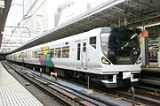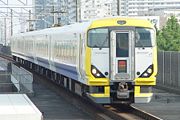
E257 series
Encyclopedia
The is a DC
electric multiple unit
operated by East Japan Railway Company
(JR East) and built jointly by Hitachi
, Kinki Sharyo
, and Tokyu Car Corporation
. Two variants exist: the original E257-0 series for use on Chūō Main Line
Azusa
and Kaiji
limited-express services, and the E257-500 series for use on Uchibō Line and Sotobō Line limited-express services.
rolling stock on Chūō Main Line Azusa and Kaiji services. Based at Matsumoto
depot, the fleet consists of sixteen 9-car sets (M101 to M116) with a full cab at the Matsumoto end and a gangwayed cab at the Tokyo end, and five 2-car "add-on" sets (M201 to M205) with a full cab at the Tokyo end and a shunting cab only at the Matsumoto end.
The type was the recipient of the 45th Blue Ribbon Award (2002) of the Japan Railfan Club.
Cars 4, 6, and 9 are each fitted with one PS37 single-arm pantograph.
The 2-car sets (M201 to M205) are formed as follows.
Car 2 is fitted with one PS37 single-arm pantograph.
Chūō Main Line
Shinonoi Line
Matsumoto-based E257 series trains were also used on the Ohayō Liner Shinjuku and Home Liner Odawara
commuter services running on the Tōkaidō Main Line
until March 14, 2008.
 The E257-500 sub-series version was delivered between July 2004 and October 2005, with the first sets entering service from 16 October 2004 on Uchibō Line Sazanami
The E257-500 sub-series version was delivered between July 2004 and October 2005, with the first sets entering service from 16 October 2004 on Uchibō Line Sazanami
and Sotobō Line Wakashio
limited-express services, replacing older 183 series
rolling stock. Based at Makuhari depot in Chiba Prefecture
, the fleet consists of 19 5-car sets (NB01 to NB19).
Unlike the Chūō Line variant, these sets have gangways at both ends.
Cars 2 and 4 are each fitted with one PS37 single-arm pantograph.
Direct current
Direct current is the unidirectional flow of electric charge. Direct current is produced by such sources as batteries, thermocouples, solar cells, and commutator-type electric machines of the dynamo type. Direct current may flow in a conductor such as a wire, but can also flow through...
electric multiple unit
Electric multiple unit
An electric multiple unit or EMU is a multiple unit train consisting of self-propelled carriages, using electricity as the motive power. An EMU requires no separate locomotive, as electric traction motors are incorporated within one or a number of the carriages...
operated by East Japan Railway Company
East Japan Railway Company
is the largest passenger railway company in the world and one of the seven Japan Railways Group companies. The company name is officially abbreviated as JR East in English, and as in Japanese. The company's headquarters are in Yoyogi, Shibuya, Tokyo....
(JR East) and built jointly by Hitachi
Hitachi
Hitachi is a multinational corporation specializing in high-technology.Hitachi may also refer to:*Hitachi, Ibaraki, Japan*Hitachi province, former province of Japan*Prince Hitachi and Princess Hitachi, members of the Japanese imperial family...
, Kinki Sharyo
Kinki Sharyo
is an Osaka, Japan-based manufacturer of railroad vehicles. It is an affiliate company of Kintetsu Corporation.In business since 1920 and renamed The Kinki Sharyo Co., Ltd in 1945...
, and Tokyu Car Corporation
Tokyu Car Corporation
is a manufacturer of heavy rail cars in Japan. The company is based in Kanazawa Ward, Yokohama, Japan, and a member of Tokyu Group. Tokyu Car manufactures rail vehicles not only for Tokyu Corporation but for other Japanese operators, including various Japan Railways Group companies and...
. Two variants exist: the original E257-0 series for use on Chūō Main Line
Chuo Main Line
The , commonly called the Chūō Line, is one of the major trunk railway lines in Japan. It runs between Tokyo and Nagoya, although it is the slowest direct railway connection between the two cities; the coastal Tōkaidō Main Line is slightly faster, while the Tōkaidō Shinkansen is the fastest rail...
Azusa
Azusa (train)
The and are limited express services operated by East Japan Railway , which run between Shinjuku and Matsumoto via the Chūō Main Line and Shinonoi Line.The name Azusa is taken from the Azusa River in Matsumoto, Nagano.-Azusa:-Super Azusa:...
and Kaiji
Kaiji (train)
The is a limited express train service in Japan operated by East Japan Railway Company . It runs mainly between Shinjuku Station in Tokyo and Kōfu Station in Kōfu, Yamanashi via the Chūō Main Line.-Kaiji:Shinjuku - Kōfu...
limited-express services, and the E257-500 series for use on Uchibō Line and Sotobō Line limited-express services.
Chūō Main Line E257-0 series
This sub-series version was introduced on December 1, 2001, to replace the aging 183 and 189 series183 series
The is a limited express EMU introduced in 1972 by Japanese National Railways , and currently operated by East Japan Railway Company and West Japan Railway Company...
rolling stock on Chūō Main Line Azusa and Kaiji services. Based at Matsumoto
Matsumoto, Nagano
is a city located in Nagano Prefecture, Japan. Matsumoto is designated as a Special City.-Outline:The new city of Matsumoto is the city comprising the mergers of the old city of Matsumoto and four villages. Matsumoto officially absorbed those villages without creating a new municipal...
depot, the fleet consists of sixteen 9-car sets (M101 to M116) with a full cab at the Matsumoto end and a gangwayed cab at the Tokyo end, and five 2-car "add-on" sets (M201 to M205) with a full cab at the Tokyo end and a shunting cab only at the Matsumoto end.
The type was the recipient of the 45th Blue Ribbon Award (2002) of the Japan Railfan Club.
Formations
The 9-car sets (M101 to M116) are formed as follows.| Car No. | 3 | 4 | 5 | 6 | 7 | 8 | 9 | 10 | 11 |
|---|---|---|---|---|---|---|---|---|---|
| Designation | Tc | M | M' | M | T | Ts | M | M' | Tc' |
| Numbering | KuHa E257-100 | MoHa E257 | MoHa E256 | MoHa E257-1000 | SaHa E257 | SaRoHa E257 | MoHa E257-100 | MoHa E256-100 | KuHa E256 |
Cars 4, 6, and 9 are each fitted with one PS37 single-arm pantograph.
The 2-car sets (M201 to M205) are formed as follows.
| Car No. | 1 | 2 |
|---|---|---|
| Designation | Tc | Mc |
| Numbering | KuHa E257 | KuMoHa E257 |
Car 2 is fitted with one PS37 single-arm pantograph.
Chūō Main LineChuo Main LineThe , commonly called the Chūō Line, is one of the major trunk railway lines in Japan. It runs between Tokyo and Nagoya, although it is the slowest direct railway connection between the two cities; the coastal Tōkaidō Main Line is slightly faster, while the Tōkaidō Shinkansen is the fastest rail...
- AzusaAzusa (train)The and are limited express services operated by East Japan Railway , which run between Shinjuku and Matsumoto via the Chūō Main Line and Shinonoi Line.The name Azusa is taken from the Azusa River in Matsumoto, Nagano.-Azusa:-Super Azusa:...
: Chiba - Tokyo - Shinjuku - Matsumoto - Minamiotari - KaijiKaiji (train)The is a limited express train service in Japan operated by East Japan Railway Company . It runs mainly between Shinjuku Station in Tokyo and Kōfu Station in Kōfu, Yamanashi via the Chūō Main Line.-Kaiji:Shinjuku - Kōfu...
: Tokyo - Shinjuku - Kōfu - Ryūō - Chūō LinerChuo LinerThe Chūō Liner is a limited-stop reserved-seat "Home Liner" service for commuters on the Chūō Rapid Line operated by East Japan Railway Company . The train operates on weekdays only...
: Tokyo - Shinjuku - Hachiōji - Takao - Ōme LinerOme LinerThe Ōme Liner is a limited-stop reserved-seat "Liner" service for commuters on the Chūō Rapid Line and Ōme Line operated by East Japan Railway Company . The train operates on weekdays only...
: Tokyo - Shinjuku - Tachikawa - Ōme
Shinonoi LineShinonoi LineThe is a rail line in Japan. Part of the East Japan Railway Company, it runs from Shinonoi Station in Nagano, Nagano Prefecture to Shiojiri Station in Shiojiri, Nagano Prefecture.The line is a corridor between the Shinetsu Main Line and the Chūō Main Line...
- Rapid: Matsumoto - Nagano
Matsumoto-based E257 series trains were also used on the Ohayō Liner Shinjuku and Home Liner Odawara
Shonan Liner
The is a "Home Liner" service for commuters on the Tōkaidō Main Line operated by East Japan Railway Company . This article also covers the morning and evening services...
commuter services running on the Tōkaidō Main Line
Tokaido Main Line
The is the busiest trunk line of the Japan Railways Group , connecting Tōkyō and Kōbe stations. It is long, not counting its many freight feeder lines around the major cities...
until March 14, 2008.
Bōsō Express E257-500 series

Sazanami
The is a limited express train service in Japan operated by East Japan Railway Company . It runs between and via the Keiyō Line and Uchibō Line.Seasonal Shinjuku Sazanami services operate at certain weekends between Shinjuku and Tateyama....
and Sotobō Line Wakashio
Wakashio
The is a limited express train service in Japan operated by East Japan Railway Company . It runs from to and in Chiba Prefecture.-Station stops:Wakashio services stop at the following stations...
limited-express services, replacing older 183 series
183 series
The is a limited express EMU introduced in 1972 by Japanese National Railways , and currently operated by East Japan Railway Company and West Japan Railway Company...
rolling stock. Based at Makuhari depot in Chiba Prefecture
Chiba Prefecture
is a prefecture of Japan located in the Kantō region and the Greater Tokyo Area. Its capital is Chiba City.- History :Chiba Prefecture was established on June 15, 1873 with the merger of Kisarazu Prefecture and Inba Prefecture...
, the fleet consists of 19 5-car sets (NB01 to NB19).
Unlike the Chūō Line variant, these sets have gangways at both ends.
Formation
The 5-car E257-500 series sets (NB01 to NB19) are formed as follows.| Car No. | 1 | 2 | 3 | 4 | 5 |
|---|---|---|---|---|---|
| Designation | Tc' | M | M' | M | Tc |
| Numbering | KuHa E256-500 | MoHa E257-1500 | MoHa E256-500 | MoHa E257-500 | KuHa E257-500 |
Cars 2 and 4 are each fitted with one PS37 single-arm pantograph.
Sōbu Main Line
- ShiosaiShiosaiThe is a limited express train service in Japan operated by East Japan Railway Company . It runs from Tokyo and Shinjuku to Chōshi in Chiba Prefecture.-History:...
: (Shinjuku) - Tokyo - Chōshi - AyameAyame (train)The is a limited express train operated by East Japan Railway Company , which runs from to and via .-Service pattern:There are two return Ayame workings daily: one return working between Tokyo and Kashima-Jingu, and one between Tokyo and Chōshi...
: Tokyo - Narita - Chōshi

